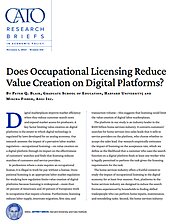Digital marketplaces improve market efficiency when they reduce customer search costs and expand market access for producers. A key factor limiting value creation on digital platforms is the extent to which digital technology is regulated by laws developed for an analog economy. Our research assesses the impact of a pervasive labor market regulation—occupational licensing—on value creation on a digital platform through its impact on the effectiveness of customers’ searches and finds that licensing reduces matches of customers and service providers.
In professions where a state requires an occupational license, it is illegal to work for pay without a license. Occupational licensing is an appropriate labor market regulation for studying how regulation limits value creation of digital platforms because licensing is widespread—more than 20 percent of Americans and 20 percent of Europeans work in occupations that require a license. Furthermore, licensing reduces labor supply, interstate migration, firm size, and transaction volume—this suggests that licensing could limit the value creation of digital labor marketplaces.
The platform in our study is an industry leader in the $500 billion home services industry. It converts customers’ searches for home services into sales leads that it sells to service providers on the platform, who choose whether to accept the sales lead. Our research empirically estimates the impact of licensing on the acceptance rate, which we define as the likelihood that a customer who uses the search function on a digital platform finds at least one worker who is legally permitted to perform the task given the licensing requirements for the task.
The home services industry offers a fruitful context to study the impact of occupational licensing in the digital economy for at least four reasons. First, platforms in the home services industry are designed to reduce the search frictions experienced by households in finding skilled tradespeople who can perform home repairs, maintenance, and remodeling tasks. Second, the home services industry offers a large sample size; we observed more than 20 million customer search queries on the platform during our sample period. Third, the home services industry employs close to 6 million workers in the United States and spans many occupations. Fourth, there is variation across states in the licensing requirements for the same task. Our research exploits this state variation to estimate the causal impact of licensing laws on the acceptance rate.
Our research finds that licensing a task reduces the acceptance rate. First, our research exploits the fact that New Jersey began requiring a license for pool contractors in 2019. Our research compares the acceptance rate for pool contractors in New Jersey with all other states before and after this policy. Across 49 state-by-state comparisons, our research finds that licensing pool contractors reduced the accept rate by an average of 10.2 percentage points (or 16 percent). The decrease in the acceptance rate, moreover, persisted for two years after the policy. Second, our research leverages national variation in the licensing requirements for all the tasks in our data by comparing the difference in the acceptance rate between adjacent counties on opposite sides of a state border when the neighboring states vary in whether they require a license to perform a given task. Using this national variation in licensing, our research finds that licensing reduces the likelihood of a service professional accepting a customer’s request by 13.9 percentage points (or 25 percent). Furthermore, using the national variation, our research demonstrates that the reduction in the acceptance rate when a task is licensed is not driven by an increase in consumer searches for the task but instead is fully explained by a reduction in the availability of service professionals to accept customer requests.
Our findings are not predicted by experts in the home services industry. We tested the accuracy of expert predictions by running a survey of 1,200 service providers in the home services industry. Contrary to what our research finds, experts predicted that licensing a task would increase the acceptance rate. The divergence between our empirical findings and the predictions of experts suggests an important role for empirical work like ours that measures the impact of regulation on value creation in digital labor markets. Our research highlights that labor market regulations developed for the analog economy, when passed onto the digital economy, limit the value created by technological innovation when those regulations reduce the acceptance rate of customers’ searches.
NOTE
This research brief is based on Peter Q. Blair and Mischa Fisher, “Does Occupational Licensing Reduce Value Creation on Digital Platforms?,” National Bureau of Economic Research Working Paper no. 30388, August 2022.

This work is licensed under a Creative Commons Attribution-NonCommercial-ShareAlike 4.0 International License.
